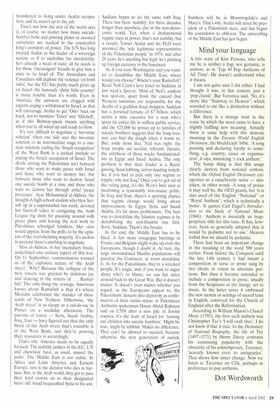Mind your language
A Bite noire of Kim Parsons, who tells me he is neither a fogy nor geriatric, is anthem, as in 'Top 40 Pop Anthems of All Time'. He doesn't understand what it means.
I am not quite sure I did either. I had thought it was, in this context, just a 'pop classic'. But Veronica said, 'No, it's more like "Stairway to Heaven", which sounded to me like a distinction without a difference.
But there is a strange twist to the route by which the word came to have a slightly baffling new meaning. Actually there is some help with this demotic meaning in the Encarta World English Dictionary, the blockheads' bible. 'A song praising and declaring loyalty to something, e.g. country, cause or organisation', it says, instancing 'a rock anthem'.
The funny thing is that this usage clearly derives from national anthem, which the Oxford English Dictionary categorises as a catachrestic sense — mistaken, in other words. A song of praise it may well be, the OED grants, but 'it is also used of the English "National" or "Royal Anthem", which is technically a hymn'. It quotes Carl Engel's Introduction to the Study of National Music (1866): 'Anthem is musically an inappropriate title for this tune. It has, however, been so generally adopted that it would be pedantic not to use.' Heaven forbid that we should be pedantic.
There had been an important change in the meaning of the word 500 years earlier. From before the Conquest until the late 14th century it had meant a composition in verse or prose sung by two choirs or voices in alternate portions. But then it became extended to include a composition in prose, usually from the Scriptures or the liturgy, set to music. In the latter sense it embraced the new motets or settings of sacred texts in English, contrived for the Church of England after the Reformation.
According to William Mason's Church Music (1795), the first such anthem was Christopher Tye's 'I will exalt thee'. I do not know if that is true. In the Dictionary of National Biography, the life of Tye (1497-1571) by Henry Davey contrasts his continuing popularity with the obscurity of his contemporary, Taverner, 'scarcely known even to antiquaries'. That shows how times change. Now we listen to Taverner on CDs, perhaps in preference to pop anthems.
Dot Wordsworth






























































 Previous page
Previous page